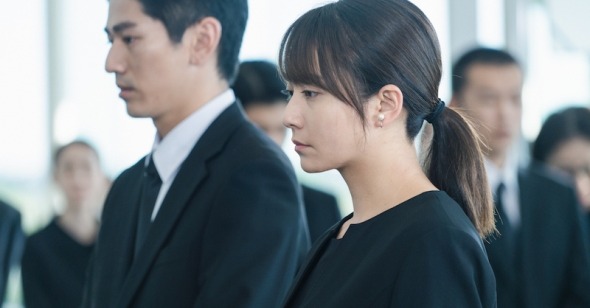Into the Light
By Bedatri D. Choudhury
Love Life
Dir. Kōji Fukada, Japan, Oscilloscope Pictures
Love Life plays Sunday, March 19 at Museum of the Moving Image's 2023 First Look festival.
A precise but gentle surgical deboning of the marital relationship between Jiro (Kento Nagayama) and Taeko (Fumino Kimura) forms the spine of Japanese filmmaker Kōji Fukada’s Love Life, which is receiving its U.S. premiere at Museum of the Moving Image’s First Look festival. While Fukada softly, deftly picks at Taeko’s relationship with Jiro, her relationship with her Korean former husband, Park (Atom Sunada), is held closer to the fire—illuminating its sharp edges, held in light for better scrutiny. The interiority of Park—who cannot speak and is unhoused—is inaccessible to everyone in the film other than Taeko, a social worker fluent in sign language. Their world is essentially a bubble that the rest of the characters can see but never touch or understand. Both of Taeko’s relationships are contained within a quiet obedience to the traditions and values that reflect the everydayness of its characters’ lives.
The film starts in the middle of Jiro planning a double celebration. His (not yet legally) adopted son Keita (Tetsuta Shimada) has just won a championship at Othello, a game he plays with his mother. (His stepfather isn’t very good and is too much of a baby, Keita says.) It’s also the birthday of Jiro’s father (Tomorowo Taguchi), and the dutiful son has gathered his coworkers to stage a surprise party, complete with balloons, streamers, and karaoke. Fukada begins to prick the surface of this perfect day, making thin fissures visible. We learn that Jiro’s marriage to Taeko, a woman who was previously married and had a son, displeases his father. His mother (Misuzu Kanno) only accepts the situation in the hope of one day having her own grandchild from Taeko.
These tensions are wrapped in a culturally specific emotional mutedness familiar to Japanese melodrama. One may expect things to stay on simmer, yet early on, a devastating tragedy occurs, threatening to undo the order of things within and surrounding this family. It’s a terrible event that would send most families into spontaneous combustion, but in true Fukada fashion, this doesn’t happen in Love Life. Instead, everything quietly implodes, and everyone is left to grapple with things in messy, dirty ways that feel truer to how our hearts and brains function.
The emotionally stifled world breaks, if briefly, for the first time when, following these tragic events, Park returns. It has been years after he abandoned his wife and son, and he stands out amidst the black-dressed funeral mourners in his dirty yellow sweater. Soon, Taeko and Jiro are looking outside of their marriage to cope with their loss, yet Fukada isn’t interested in building out a scandal. Husband and wife each bond with their exes to make sense of their grief, and the drama stays at the level of a controlled simmer, always threatening to rise to a flame.
Love Life, which sounds like the title of a romantic drama, is rather a meditation on grief. The “love” itself is there, if underplayed compared to the usual ways in which films of the West express it. There are two kisses in the film: one stolen between newlyweds and the other an act of jealousy that borders on violence. Love often takes the form of obedience and duty, pulling someone out of pain and into the everyday-ness of things. Rather than moving on, the film advocates a way of living through grief, while asking its characters to look for what makes life worth living.
The grief that coats everything and everyone in the film also forges unexpected bonds. Jiro’s father opens his house to Taeko, which allows Taeko's mother-in-law, in a rare scene with only two women talking, to talk to Taeko about her own personal faith and confess that what scares her most is dying alone. Within a society built on familial honor, duty, and sacrifice, this confession of loneliness from a woman whose life is dedicated to constant caring and nurturing, registers as brutally direct and stirring, an expression of honesty and love Fukuda doesn’t allow his men.
Despite its themes, Love Life is punctuated by surprising humor. No single character is comical per se, but Fukada’s storytelling leans heavily into the darkly funny turns our lives take when we least expect them. Park’s continued betrayal of Taeko’s trust could easily come across as villainous, but the filmmaker finds a way of rerouting the character’s arc so that the audience may have difficulty staying angry at him, whether in humorous ways, such as his fostering a wayward kitten, or in deeper emotional revelations, as in the moments when he tries to walk Taeko out of her mountain of grief.
Both Taeko and her mother-in-law hang CDs from a string on their respective little balconies—part lucky charm and part pigeon repellent—which refract sunlight into the surrounding homes. The characters all seem to live in the glow of this ephemeral light, and they continue chasing it when it gets too dark. Despite their circuitous emotional journeys, they all end up where they belong, to a place they can call home—where they can reclaim what has been lost, at least before it gets dark again.
